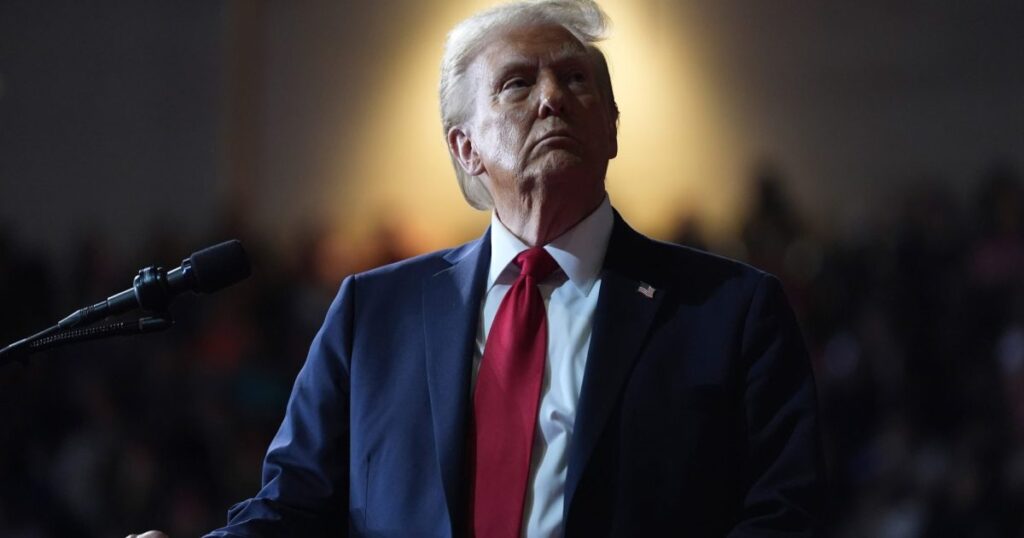Trump has called fact-based journalism he dislikes “fake news.” Press freedom advocates fear his attacks could escalate in his next term.Evan Vucci/AP
Press freedom groups have a stark warning for Americans: Trump could pose a serious threat to fact-based journalism during his next term in office if he does not change course.
The Committee to Protect Journalists, Reporters Without Borders, and Freedom of the Press Foundation all issued statements in the aftermath of Trump’s win this week, urging the ex- and soon-to-be president and his administration to commit to respecting the free press during the next four years. “Attacking the press is really an attack on American citizens’ right to know,” Reporters Without Borders Executive Director Clayton Weimers said in a statement. “Trump’s new administration can and must change its tune with the media and take concrete steps to protect journalists and develop a climate conducive to a robust and pluralistic news media.”
This will be a tall order for Trump: At a rally just last weekend, he said he would be OK with a crowd of journalists being shot at, as I reported at the time. His communications director, Steven Cheung, tried to clean up his comments by implausibly alleging that Trump “was actually looking out for their welfare, far more than his own!” From early September until the end of October, Trump verbally attacked the media more than 100 times, Reporters Without Borders found in an analysis published last month. Trump has repeatedly derided journalists as “fake news” and the media as “the enemy of the people.” And as my colleague Pema Levy reported, Trump also launched what experts said was a frivolous lawsuit against CBS News last month, alleging that producers unfairly edited a 60 Minutes interview with his Democratic opponent, Vice President Kamala Harris, to make her look better. His campaign also submitted a complaint to the Federal Election Commission claiming that the Washington Post was running a paid advertising campaign to boost stories critical of Trump; a Post spokesperson said the allegations were “improper” and “without merit.” CNN also reported that Trump has called at least 15 times for the Federal Communications Commission to revoke the broadcast licenses of networks he dislikes.
All this makes it no wonder, then, that Reporters Without Borders said Trump’s reelection “marks a dangerous moment for American journalism and global press freedom.” The Committee to Protect Journalists struck a similar tone. “Legal persecution, imprisonment, physical violence, and even killings have sadly become familiar threats for journalists across the world,” its statement said. “They must not now also become commonplace in the United States, where threats of violence and online harassment have in recent years become routine.” And Freedom of the Press Foundation claimed that Trump “will try to destroy press freedom”; as the group noted, Trump will have an ally in Elon Musk, who has spread pro-Trump disinformation on his platform to the tune of billions of views in the lead-up to Election Day. More recently, Musk has taken to telling everyday X users that they are the media now and “citizen journalism is the future.” (Apparently his conception of journalism sees conspiracy theories as acceptable and fact-checks as unnecessary.)
This all comes at a time when Republicans, and young people, are as likely to trust social media as a news source as they are to trust national news outlets, according to data published last month from Pew Research Center. The Trump campaign and the GOP have both contributed to and capitalized on this distrust, with Trump launching his own social media network, Truth Social, in 2022, and eschewing the cable news sit-downs Harris did during the campaign for interviews with right-wing male podcasters, who likely helped him make massive gains among young men this year. Media outlets hoping to win back the trust of these voters, though, will not just have podcasters and social media to compete with: One of their biggest adversaries will likely be Trump himself.
Spokespeople for the Trump campaign did not immediately respond to questions from Mother Jones on Sunday.

